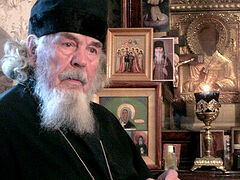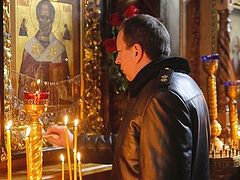This conversation took place on the first day of the Radiant Resurrection of Christ in 2019. Unfortunately, its hero, Archpriest Vyacheslav Perevezentsev, rector of St. Nicholas Church in the village of Makarovka in the Moscow region for many years, died at the beginning of Lent this year at the age of fifty-five.
 Archpriest Vyacheslav Perevezentsev
Archpriest Vyacheslav Perevezentsev
—We are meeting today with a special feeling as we see everything around us rejoicing. As our spiritual teachers say, nature itself is experiencing the Feast of Christ’s Resurrection: the central moment in the life of every Orthodox person. I would like you to share this Good News of the Risen Christ with readers.
—Christ is Risen! I sincerely greet everyone. I think that Pascha is such an amazing holiday that enters our lives, our feelings, our hearts on the Paschal night—it is with us not only these days. According to an ancient liturgical tradition, Pascha lasts forty days, and during this period, Paschal hymns are sung in our churches and we greet each other with the Paschal greeting, “Christ is Risen!” And we need to try and keep this joy in ourselves. A joy that none of us deserves, and no one is worthy of this Gift—the Gift of Eternal Life, which comes to us through this event.
I think it is very important for us to remember what I have just said: that it is a Gift. A Gift that cannot be earned, bought or acquired, but at the same time a Gift for which we must always be prepared.
Imagine that you are leaving the supermarket. You have been there for hours, bought whatever your heart desired, and your hands are full with bags. As you leave the store someone comes up to you and says, “I want to offer you this…” You perfectly understand that he is offering a very necessary thing, but your hands are full and you cannot accept this gift!
This is very important. All the time that we spent before Pascha: the period of Lent, which we call the preparation for Pascha, then Holy Week—the time of deep repentance—I really hope that we were able to use this time to prepare a place for Christ in our hearts. The Lord said of Himself: The foxes have holes, and the birds of the air have nests; but the Son of man hath not where to lay His head (Mt. 8:20). And where can He do it? Only in our hearts! They must be ready for this—they must wait for the Lord to enter them. This is the first condition for real joy: there should be anticipation and a place for God in our hearts.
Likewise, our hearts should be able to keep this gift. What am I talking about? Something you all perfectly understand.
Imagine that you need to bring home an amazing drink, which your children and loved ones are looking forward to. But the vessel you need to carry it in is leaky and full of holes. You have the drink, and it is wonderful. And you have the desire to bring it, but the vessel is not prepared because the drink is spilling.
And this is something that we should never forget. The gift is given to us, but we must be ready to receive it and keep it in our hearts. Our hearts must be ready for this! Because the Gift of the Holy Spirit, as the Lord says, is Fire a Consuming (Deut. 9:3). I am come to send fire on the earth; and what will I, if it be already kindled? (Lk. 12:49). That's what it is! It is the Fire that consumes our hearts.
And if the vessel of our heart is made of straw, wood or something like that, it will be consumed by fire.
—I think that a huge responsibility, perhaps the main responsibility, rests with those who pass this gift on by inheritance and transfer grace. I partly mean us, but mostly priests and missionaries, guaranteeing the connection between generations, as it were.
Not long ago the [Russian] Church occupied a “clear” place in the Soviet State and for Soviet people, and, in spite of this, it was a real Church. But now many complain that the Church (in their understanding) has become something like a club or a hobby group, and the attitude towards it is no longer as serious, even among atheists, as it was several decades ago.
As for the Gift: the Gospel speaks about the pearl of great price (Mt. 13:46), that if a person finds it, he is ready to sell everything to obtain it. And, answering your example of someone’s busy hands after shopping in a supermarket: if a person sees that this Gift is genuine and surpassing everything, he will throw his bags, throw everything out of his shopping cart, change his whole life and give up everything unnecessary to make room for this One True Gift, won’t he?
—Yes. But you have just touched on the most fundamental topic, which we can’t avoid reflecting on during these Paschal days. Now we are celebrating the bright, radiant days of Pascha, but quite recently we experienced the period of Holy Week. And now one of the terrible lessons of those sorrowful days for us is how people clung to the Savior during His solemn Entry into Jerusalem (they surrounded Him, everyone wanted to touch Him and get something from Him)! Everyone believed that what they had been waiting for and dreamed about, what the prophets had written about had finally come true! The Kingdom of Israel would be established, for the Messiah, the long-awaited Savior was finally there! And then how everything changed within several days!
How these people changed! How their hearts changed, which had been filled with such hope! They suddenly began to shout, “Crucify Him!” What happened? They suddenly realized what that Man could give them, what the Lord had brought them.
His Kingdom is not of this world. It is not what they needed and wanted. And when some people now say, “Look, people expect something from the Church...” Well, they can expect a lot from the Church: some expect truth and consolation; others—good health; others—solutions to their everyday problems; others—a renewal of ideology that was abandoned, and so on.
Everything can be found in the Church. But the Church is not of this world; that is not what it’s about!
In fact, the Lord can give us only one thing: victory over death! And if we don’t need this, we will be very disappointed because we can receive everything else outside the Church (or maybe we can’t). But no one else will give us what the Lord can give us!
The Lord gives us eternal life. He brings us salvation, but not just from some temporary problems, failures or difficulties. Whether this would help or not, we don’t know. We understand perfectly well how often it is quite the opposite. The Lord doesn’t deceive us, unlike some preachers who can easily say, “Come to me! Come to Christ! Come to the Church—and you won’t have problems…” But the Church is not a patent medicine that you can buy for a headache or something else. The Church tells us something completely different: In the Gospel we read that the Lord came to earth to save us from sin and from the most terrible consequence of sin—death.
This is our joy today—we are rejoicing because Christ is Risen, because we know that this victory has taken place. As the Apostle Paul said, And if Christ be not risen, then is our preaching vain, and your faith is also vain (1 Cor. 15:14). But Christ was resurrected.
In the early or mid-1990s, when many were drawn to the Church. a wise man was asked, “What can your Church give us in modern society today?” Many others answered, “Well, it can give a lot. We have such a tradition, such a philosophy, such a culture.” But the wise man’s reply was different, “The Church can give you only one thing: Jesus Christ.” If you need Jesus Christ, the Crucified and Risen God, the God Who Came to save us, then you can receive what no one else in the world can give you. And you will receive the most precious thing—eternal life. And if you don’t need Him, you actually don’t need the Church either.
—Isn’t it a terrible paradox of modern society? Today we involuntarily have such an ideology that the Church (and being active in the Church) is seen as a status for wealthy, self-sufficient and authoritative people. It is considered “the right thing” to be Orthodox, attend church services, participate in sacraments and rites, and follow Church traditions. But that era of old grannies, beggars, “holy fools” and the sick (you probably know about these firsthand as you have a rural church) is something different: it is hard to tolerate and somehow uncomfortable. It discredits the “good image” shown on TV or the internet.
—Much of this is not surprising to me. I came to the Church back in the Soviet era, when it was impossible to hear publicly from a person who was more or less settled, with a career, that he believed in Christ or that he was an Orthodox believer. Everything would have ended right away! Students were expelled from universities, people were fired from their jobs if they did something like that demonstratively or at least didn’t conceal the fact that they were Christians.
—Some were sent to mental hospitals.
—Yes, to mental hospitals, or were imprisoned.
 Alexander Ogorodnikov One such example is a wonderful man that I know, Alexander Ogorodnikov,1 who came to the Church in the mid-1970s. There were underground circles; they studied Russian religious literature, read Fyodor Dostoevsky, and tried to live according to the teachings of the Gospel.
Alexander Ogorodnikov One such example is a wonderful man that I know, Alexander Ogorodnikov,1 who came to the Church in the mid-1970s. There were underground circles; they studied Russian religious literature, read Fyodor Dostoevsky, and tried to live according to the teachings of the Gospel.
And, clearly, the people in the State who were responsible for “public morality” (I mean intelligence services, not the Komsomols) observed and watched all this. And in the mid-1980s, there was a massive clean-up of those informal, dissident (above all, in the spiritual sense) circles. And young Alexander Ogorodnikov and his people were among them.
I remember Alexander's story about how the state agents came to him and said, “We know that you are very stubborn, fanatical, and you won’t give up anything. We are not beasts—leave the country! We won’t get in your way, we’ll even help you!” Back then many tried to leave the USSR and emigrate somewhere. “Prisoners of conscience” were expelled: they would find a place in the West and wouldn’t have any problems there.
—They would find a niche there…
—Maybe Alexander would have found a niche there. Or would have done something good for Russia, as many did: speaking in religious programs on the radio, collecting donations, etc. But he said, “This is my country, and I love it very much. I'm not going anywhere. If you don’t like something here, you can leave yourselves!” And their reply was, “Then prison awaits you!” He was jailed and languished in different prisons and camps. They used torture to break prisoners and force them to change and renounce their beliefs.
Faith always requires a sacrifice, a gift from the believer. A person can say, “I love…” But what does he mean by this word? “I love tomatoes because they are delicious and sweet.” But when it comes to parents and children, a husband and a wife, this is absolutely different from loving tomatoes. When you love someone, you are ready to sacrifice something for this person, to give him something you hold dear. It will be true love. Faith is actually the same thing.
If we take the Slavonic roots of this word, “faith” (“vera”) means “trust” or “loyalty.” And in Latin “fides” means “gift.” Faith is always associated with what I am ready to give.
Alas, we sometimes have this pagan idea in our minds that “if I believe, then will God help me.” Yes, He really helps, but true faith is when I understand that He needs me. But, we think, God is the Absolute Fullness, and He can’t need anyone or anything. But our God needs us. He says, Inasmuch as ye have done it unto one of the least of these My brethren, ye have done it unto Me (Mt. 25:40). He calls for this all the time. He needs us to be His hands, feet and mouth here on earth. This requires a sacrifice from us.
It is no coincidence that the Lord said, If any man will come after Me, let him deny himself, and take up his cross, and follow Me (Mt. 16:24). It doesn’t really matter whether you are wealthy and educated or simple and uneducated. Situations vary. There were many noble and rich people in history who were real Christians, too. Look at our Church calendar: There were princes, bishops and some wealthy people among our saints. They were real Christians because they were ready to sacrifice, to give. Many of them became martyrs and confessors at the end of their lives.
And there were ordinary people. They didn’t understand faith as something to be “received,” but as a call to be on God’s side in this world. You can be His servant in a sense that many people today simply don’t understand. When they hear the expression, “the servant of God,” they consider it to be something humiliating and bad. But a “servant” is a “worker”; a servant of God is someone who already, here on earth, is willing, wants and strives to do God's work. He enlists in God’s army, as it were. This is what it means to be a Christian: it means that you are ready to do this.
Sometimes we get annoyed when a politician or actor says he believes in God, sometimes they are shown in church on TV. And it is difficult for us to judge because we don’t know for certain what one or another person is guided by. If he is truly ready, for God’s sake, to do something and give up something for the sake of people, he is a Christian.
Because faith always presents us with a choice: We can choose what can brings us closer to God or we can choose the opposite. And if this is all just a cover or a game (today there are all sorts of role-playing games), then who is this person fooling? If he is fooling viewers with some kind of aim, then this is “understandable.” But if he is kidding himself, then what for?
To be continued.



